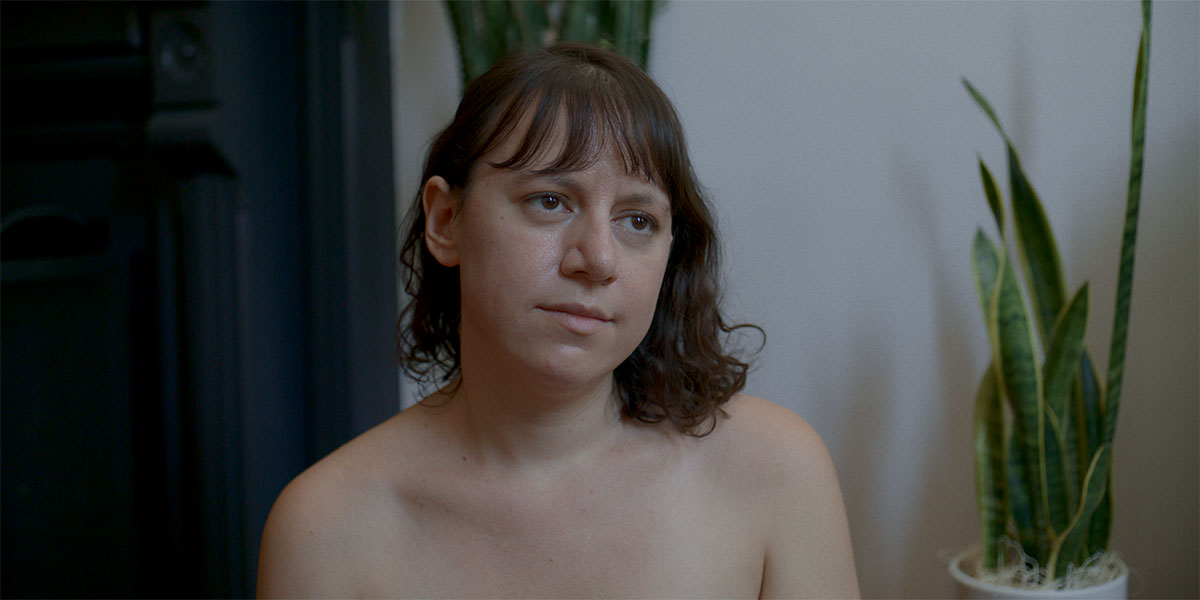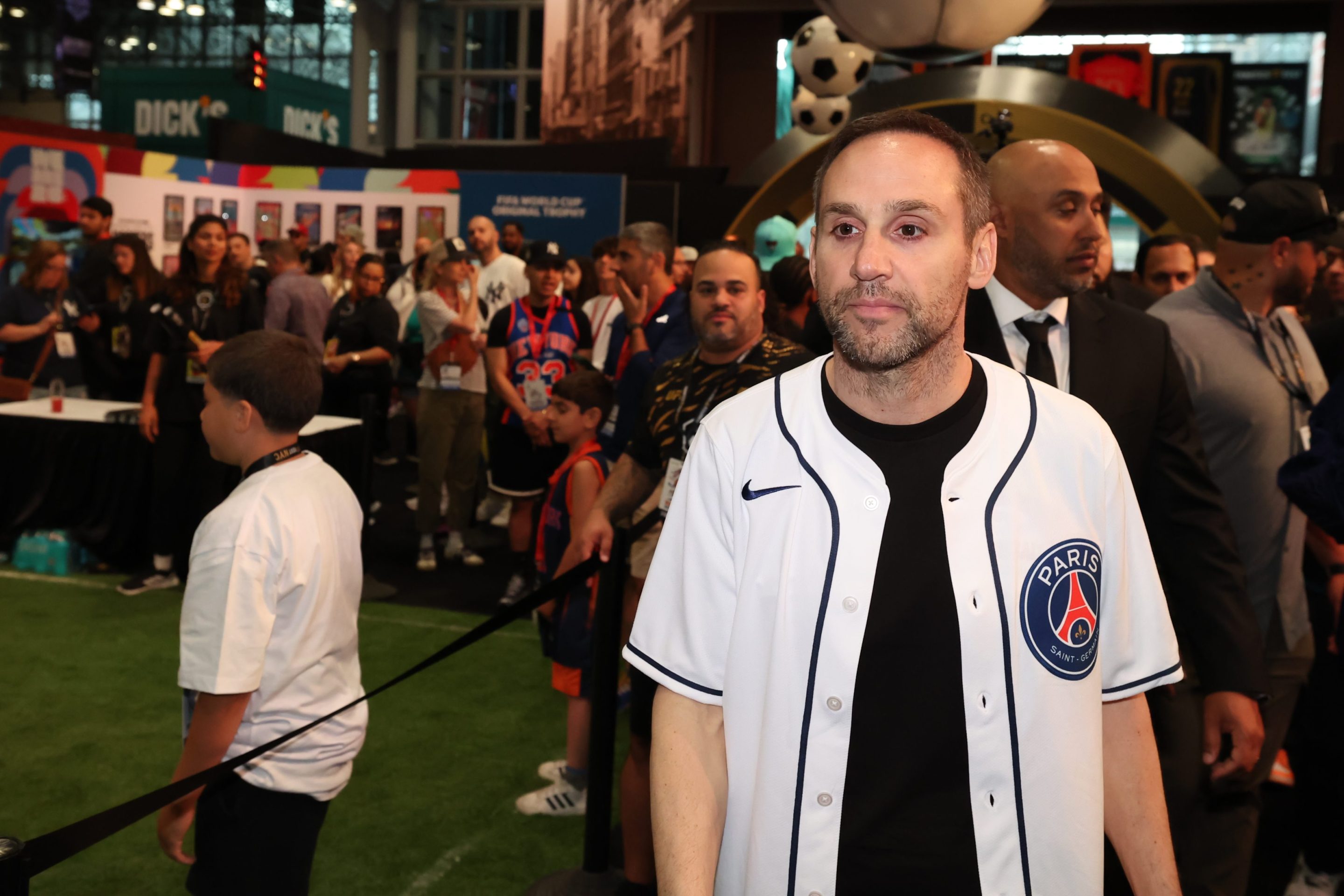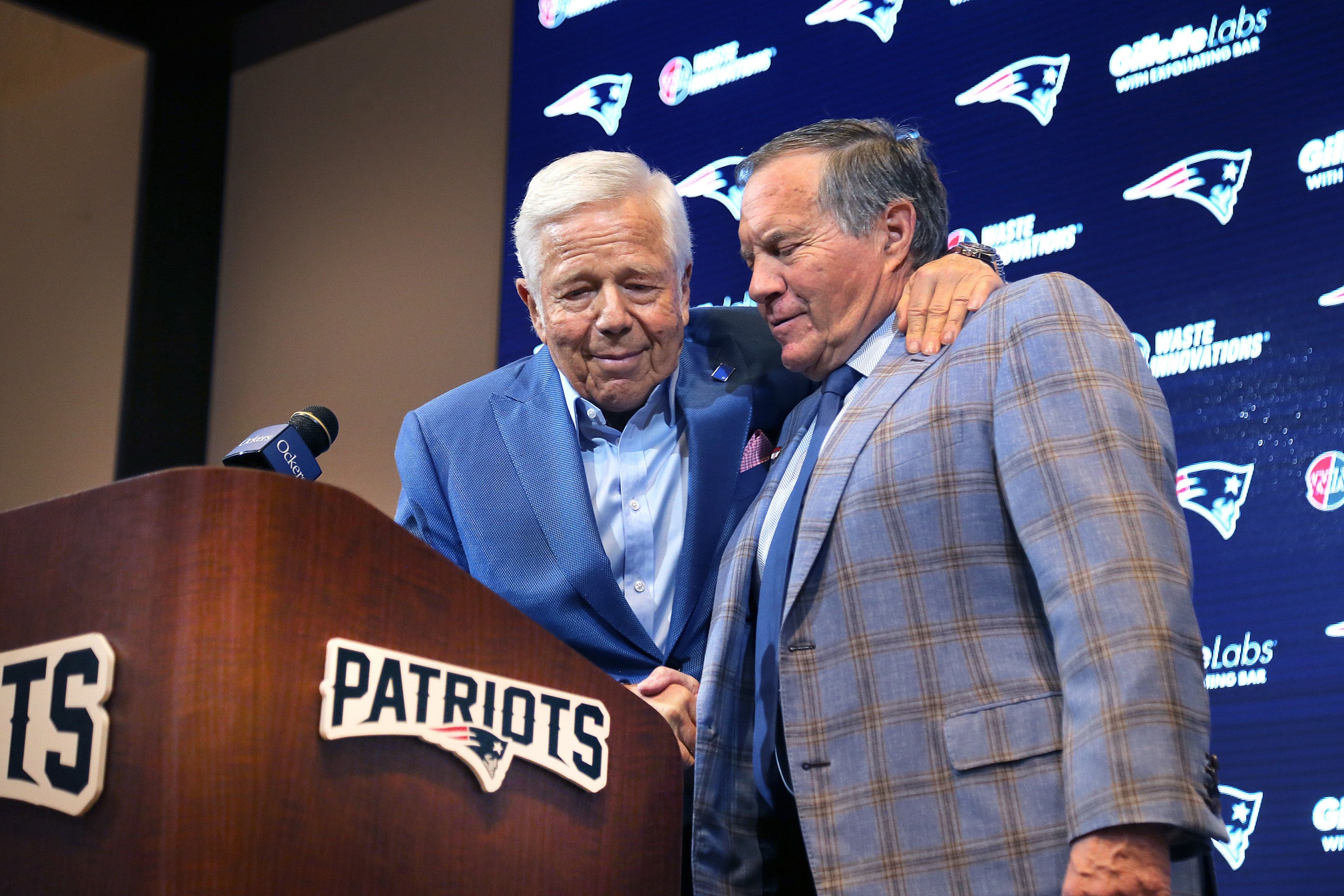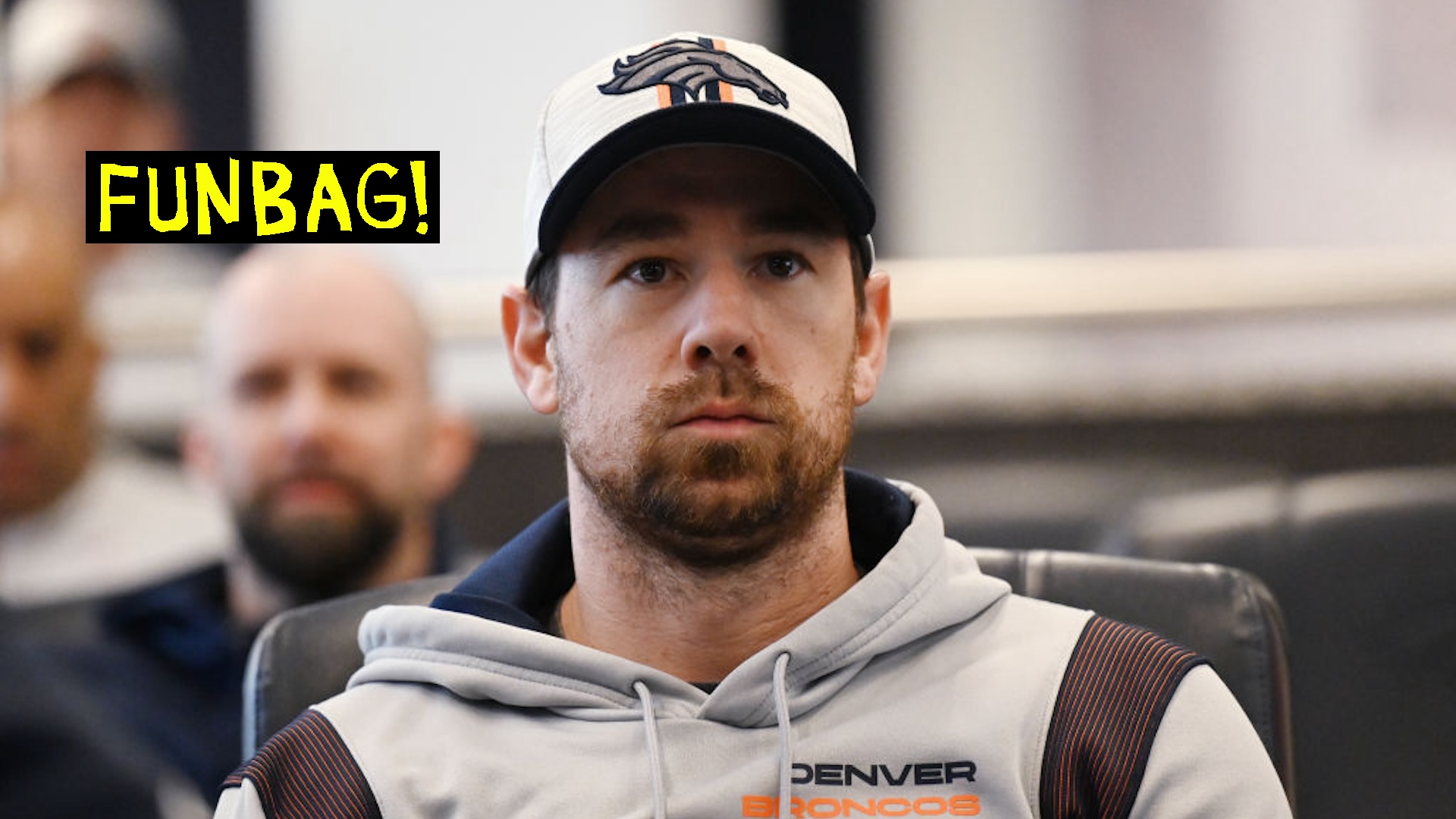My camera decided to stop working for my interview with Joanna Arnow, which seemed fitting. There are multiple scenes in her first feature, The Feeling That the Time for Doing Something Has Passed—which she directed, wrote and edited and in which she also stars—in which we see her character sitting in front of a computer screen having an audio conversation with her boss, while their photos stand in for them. In this instance, in a sweet gesture, she kept her camera on despite mine being black. Arnow was doing the interview while at the Brooklyn-based post-production facility Nice Dissolve and the background—sparse, geometric pine shelf with a lone bottle of glue on it—was reminiscent of her stripped-down films, the difference being that she was a much more animated presence in person than she often is on screen.
The Feeling That the Time for Doing Something Has Passed, which is executive produced by Sean Baker (Red Rocket) and had its debut at Cannes before playing the Toronto International Film Festival (where I saw it), arrives after Arnow’s three similarly self-reflective shorts—i hate myself :) (2013), Bad at Dancing (2015), Laying Out (2019)—and was one of my favorites at this year’s fest. The premise is almost beside the point, but it is a series of vignettes named for the men with whom Ann (Arnow) engages in comically absurd BDSM relationships, interspersed with comically absurd scenes with her Jewish family (Ann’s parents are played by Arnow’s) and at her corporate job. The most long-lasting and perhaps least energetic of her relationships is with an older man, Allen (Scott Cohen, whom you might know, like me, from Gilmore Girls). The space within the shots, the stillness of the scenes, the smart editing, renders this film with very little action a pregnant landscape in which to co-mingle with what is unsaid as much as what is said, what is undone as much as done. As Arnow explains it, “Because it’s a film that draws on personal experience—not autobiographical, but I call it auto-fiction—in the writing, and acting of it, and even editing, I hope that it becomes more specific and personal.”
I was considering writing mostly about the deadpan quality of Arnow’s work. Because the emotion is so contained, you would think her film would encourage the kind of reflection that art house cinema and even some video art provokes. Instead, because of Ann’s fairly consistent nudity throughout the film (particularly with Allen, where it stands out because he is often fully clothed), The Feeling That the Time for Doing Something Has Passed has prompted comparisons to Lena Dunham’s work, which Arnow does not love. “I admire her trailblazing work, but think our work is very different and don’t really understand or appreciate the comparison,” Arnow told Variety ahead of her film’s premiere in May. “I hope, as more women direct films, that will give other female filmmakers a broader group of women to be compared against. We also don’t only have to be compared to each other.”
I talked for half an hour with Arnow, who started out in documentaries (she has often cited Caveh Zahedi and Ross McElwee as favorites) before making her shorts. Last year she left her day job to make The Feeling That the Time for Doing Something Has Passed, which is expected to be released next year, and is now freelance shooting and editing (“Tricky times with the strike”) while working on her features. Our conversation is edited for clarity.
I read that you came up with the deadpan approach back on Bad at Dancing.
Yeah, I think that was the first time I explored self-deprecating deadpan humor related to a character that was a version of myself. With Bad at Dancing, I was looking to create a story with a level of one layer of removal from everyday reality. For me, some of that is shooting in black and white and having this minimalist style, and some of it is creating a deadpan tone, both in the writing and the acting style, which I think gives the audience space to take in the story on its own terms. It just gives space for the words to hit you differently. I’m very interested in the gray areas in both relationships and story. I think a deadpan quality where there’s a little bit more uncertainty about relationships and reactions helps.
Presumably it also dictates the look and the rhythm of the filmmaking?
I see it as a comedy, first and foremost, and so I like to give space for the comedy to play out, and for audiences to see the whole entire absurd context of it; so using a long shot and long take aesthetic to give that space. I wanted the world to, in some way, reflect the mentality of the main character and the uncomfortable way that she’s existing and grappling with her relationships and where she fits into her life.
You often mention Tsai Ming-liang in interviews. I was wondering what it is about his films that you are so attached to.
I guess, again, a long take, long shot, static style. How he lets these very off-kilter comedies play out in these lives with so much space for the audience to find their entry points in their own way, playing with relationships that aren’t completely defined.
I see a lot of ‘90s indie in your stuff as well, like Hal Hartley, Todd Solondz, Jim Jarmusch.
I definitely admire these filmmakers, but I wouldn’t call any of them references for me specifically. I mainly like to write these films, and then think about how best to tell these stories and just make choices based on how I think it would impact the audience, without so much looking to other films for inspiration, which I think isn’t the most popular viewpoint. A lot of other people like to talk about their references, but that’s just my approach. I would say, I was very interested in experimenting with vignette-based narrative and concise humor. I had been reading a collection of short stories by Carmen Maria Machado (Her Body and Other Parties) around the time I started writing this, so that made me excited about the possibilities of new narrative forms.
I know you had planned to do another movie. What made you choose this one instead?
Well, that first one had been taking a while to get off the ground for various reasons. And I really missed writing—it had been a minute. I sometimes feel like the desire to write can build up. And playing with this new form of short scenes was ... I don’t know, it was just very exciting. I just start writing and see where it goes—I don’t outline before and I don’t have any images. The dialogue is the most exciting part. That’s what gives me energy and makes me excited to keep going and then more ideas unfold from there.
I think I read The Feeling That the Time for Doing Something Has Passed took eight years to make. Can you explain some of the process?
The eight years was the time it took me from the feature that I’d been trying to get off the ground before this one. So from 2015 to 2017, I wrote that script. I was also doing other things, working and so on. Then, from 2017 to 2019, we were raising funds and trying to cast and working on early development. Then we hit some roadblocks with that one. I started writing this new one in the meantime, so that was between 2019 and 2020-ish. Early 2021, we got some cast traction. We tried to make it but it got delayed for a whole complex array of reasons. We ended up making it in 2022.
Was part of the problem the pandemic?
We were operating on a very small budget, so having the infrastructure and extra budget to deal with COVID was one of the reasons we were delayed.
And how did you land Scott Cohen?
One of our producers, Pierce Varous, had worked with Scott previously, and suggested him. I had been looking for someone who could bring a lot of comedy to the role, but also complexity.
Did he have a full understanding of what you were doing?
First of all, he came down for rehearsals, which was really great, to talk about character and just get to know each other a bit and work on blocking for the scenes, which are vulnerable. As an actor, and as a director, one thing that makes me feel prepared is staging the scenes, becoming familiar with them ahead of time and getting in your body, so you know what’s coming. For the sex scenes in particular, talking about everything in advance and making sure everyone feels comfortable.
I read that you wanted to be an actor initially. Was this the kind of performance you were looking to do?
I might have overstated that before? It’s more like I liked acting in high school. All of a sudden, I’m seeing I’m an “actor turned director,” and I’m just like, Oh, did I say something? But, yeah, I wanted to be an actor in high school. It’s just very exciting that I could find my way back to it this way. I never imagined that I would be directing films and acting in them. I guess, if you’ve got the bug, it’s hard to give it up.
Are your parents pretty on board with all this, or are they like, What are you doing, Joanna?
[Laughs] I was just laughing because they called me up and wanted to talk about a review. They agreed with some of the critique and I didn’t agree with the critique. We were discussing that this morning. But, in general, they’ve been very supportive and I’m very happy that they agreed to be in this movie.
I love that they read your reviews.
[Laughs] I’m glad you love it.
Do you take stuff from the critiques?
I definitely read all reactions to the film—Letterboxd and critics. I don’t agree with many takes, often, but it’s always interesting and informative. I have a lot of rough-cut screenings in the process [of making films] and get a lot of feedback. A lot of people I know are filmmakers, so it’s people who have seen my work before and who I really trust their opinion and are often collaborators in some shape or form. I also like to try and recruit people who don’t know me at all, people who aren’t filmmakers, just to get a variety of people. I did, I think, about seven or so rough-cut screenings [for The Feeling That the Time for Doing Something Has Passed ] a bunch of them at Nice Dissolve, where I edited—where I am now—and a couple at Brooklyn Filmmakers Collective.
There’s often a lack of generosity around the reception to women’s work when it veers into reality—I don’t know if you’ve felt that…
Definitely. I feel like people use a lot of coded vocabulary to talk about women’s films, especially if they’re drawing on personal material that I don’t think they would do when talking about a film directed by a male. The words I get are “cringe-worthy,” “raw,” “millennial,” things in that vein, which I feel are very distancing. I feel like they take away the intellectual value of the work. If I say so myself, a lot of thought went into crafting [The Feeling That the Time for Doing Something Has Passed ] and building cinematic language to express the story and it has a non-traditional structure. Then these words are just like…pointing at the most maybe sensational parts of the film, as if that’s the value of the film. Whereas, I don’t really see it as a sensational or edgy film in terms of its portrayal of sexuality at all. So it’s always strange for me when people are picking that out as the main thing. And then also using these words that kind of ghettoize it? I feel like outsider comedy would be a term. That seems interesting to me. But I don’t usually get things like that.






